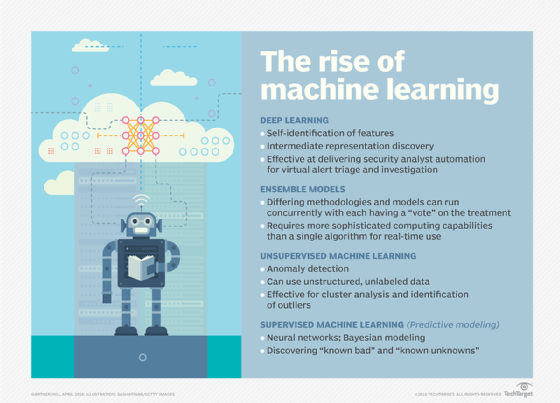Cloud adoption and data use are on the rise, and machine learning is a key part of the way data is being used, with many applications across various industries. With it, applications can more accurately predict outcomes without extensive programming. For data science engineers, a machine learning certification is critical; it is also a great step for other IT professionals to further or change careers.
ML certifications serve as proof that a tech professional passed an official exam that adequately tested their knowledge of the subject. A few of the most popular ML certifications are from cloud vendors, such as AWS, Google, IBM and Microsoft. Certifications from these vendors include the following:
- AWS Certified Machine Learning — Specialty.
- Google Cloud Professional Machine Learning Engineer.
- IBM Machine Learning Professional Certificate.
- Microsoft Certified: Azure Data Scientist Associate.
Each certification requires a different course of study and usually an exam. Vendors provide information on what to expect and recommended study tips and materials to prepare for each exam.
Why is a machine learning certificate important?
ML expertise is in demand, yet it’s not exactly easy to get hired as an ML engineer or specialist given the specificity of skills required for today’s jobs. Having an ML certificate ensures you’ve mastered the crucial skills that jobs in this market require.
Data scientists, data analysts, software developers and others working in related fields will find the skills obtained from these programs useful as well. Given how AI and ML have exploded in use and popularity over the last few years, these technologies are showing up throughout IT environments. AI and ML skills won’t become obsolete anytime soon, and ML industry experts will continue to be needed.
Certifications provide the following advantages:
- Proof of an IT professional’s expertise.
- Hands-on experience dealing with real-world problems using machine learning tools and data sets that emulate real-world experiences.
- Up-to-date insight and skills for an ever-changing field because ML certification courses are regularly updated.

AWS Certified Machine Learning — Specialty
The AWS Certified Machine Learning — Specialty exam covers four areas of expertise:
- Data engineering. Tasks include creating data repositories for ML and identifying and implementing data ingestion and data transformation solutions.
- Exploratory data analysis. Tasks include sanitizing and preparing data for modeling, performing feature engineering, and analyzing and visualizing data for ML.
- Modeling. Tasks include framing business problems as ML problems, selecting the appropriate models for a given ML problem, evaluating ML models, and performing hyperparameter optimization.
- Machine learning implementation and operations. Tasks include building ML solutions for performance, availability, scalability, resiliency and fault tolerance; recommending and implementing the appropriate ML services and features for a given problem; applying basic AWS security practices to ML solutions; and deploying and operationalizing ML solutions.
Exam takers should be familiar with topics such as data ingestion and transformation, data cleaning, data visualization, turning business problems into machine learning problems, training ML models and implementing ML services in AWS. To prepare for the exam, candidates should have at least two years of experience developing and running machine learning workloads on AWS.
A great way to get experience is through AWS’ machine learning training classes. It offers free ML-related classes, including “Process Model: CRISP-DM on the AWS Stack” and “The Elements of Data Science.” On top of these, two paid courses from the cloud provider could be helpful:
Amazon’s ML certification exam takes three hours, includes 65 questions and costs $300. The test is available as a proctored online exam or in person at a testing center.
Supplemental resources
To supplement the learning further, “AWS Certified Machine Learning Specialty 2024 — Hands On!” is a well-reviewed Udemy course that covers subjects such as modeling, the Amazon SageMaker ML platform, generative AI and feature engineering. These topics appear on the AWS exam and are worth reviewing.
Google Cloud Professional Machine Learning Engineer
The Google Cloud Professional Machine Learning Engineer certification covers six primary categories:
- Architecting low-code ML solutions.
- Collaborating within and across teams to manage data and models.
- Scaling prototypes into ML models.
- Serving and scaling models.
- Automating and orchestrating ML pipelines.
- Monitoring ML solutions.
Google recommends at least three years of hands-on experience with its cloud platform before taking the exam. It provides a recommended learning path for this certification to get up to speed on machine learning with its cloud platform. Google’s Data Scientist and Machine Learning Engineer learning path begins with the fundamentals of big data and machine learning. Then, it progresses into topics such as Google’s ML platform, TensorFlow; machine learning operations fundamentals; and ML pipelines.
The Google Cloud Professional Machine Learning Engineer certification exam can be taken remotely or at a local testing center. It is two hours long and costs $200 with 50-60 multiple-choice and multiple-select questions.
Supplemental resources
Other preparation material includes Google’s course called “Preparing for Google Cloud Certification: Machine Learning Engineer Professional Certificate” that Coursera provides. The “Google Cloud Professional Data Engineer: Get Certified 2022” course on Udemy also teaches machine learning and data pipeline topics covered by the exam.
IBM Machine Learning Professional Certificate
IBM’s Machine Learning Professional Certificate program covers four broad areas: reinforcement learning, deep learning, supervised learning and unsupervised learning. IBM also recommends having basic computer science skills, as well as knowledge of linear algebra, statistics and Python programming.
IBM offers the following six courses on Coursera that candidates must pass to earn the certificate:
- “Exploratory Data Analysis for Machine Learning.”
- “Supervised Machine Learning: Regression.”
- “Supervised Machine Learning: Classification.”
- “Unsupervised Machine Learning.”
- “Deep Learning and Reinforcement Learning.”
- “Machine Learning Capstone.”
Supplemental resources
Other than having IBM’s recommended knowledge of certain areas before starting these courses, there aren’t any prerequisites or required programming experience. However, IBM offers a useful learning path with various training assets to test your ML skills at the Associate, Professional and Advanced levels.
Microsoft Certified: Azure Data Scientist Associate
The Azure Data Scientist Associate certification is the most beginner-friendly of the certifications covered here. The exam required to get this certification is called “DP-100: Designing and Implementing a Data Science Solution on Azure.”
Microsoft expects test takers to have working knowledge of how to implement and run machine learning models on the Azure cloud platform, as well as train predictive models.
Microsoft is transparent about how the DP-100 exam dives into each general topic:
- 20%-25% on designing and preparing a machine learning solution.
- 35%-40% on exploring data and training models.
- 20%-25% on preparing a model for deployment.
- 10%-15% on deploying and retraining a model.
Microsoft offers six self-paced learning paths that together cover a lot of the exam’s subject matter:
- “Explore the Azure Machine Learning workspace.”
- “Work with data in Azure Machine Learning.”
- “Automate machine learning model selection with Azure Machine Learning.”
- “Train models with scripts in Azure Machine Learning.”
- “Optimize model training with pipelines in Azure Machine Learning.”
- “Deploy and consume models with Azure Machine Learning.”
These courses vary in length from one to five hours. Users can also take an instructor-led course titled “Designing and implementing a data science solution on Azure.” For even more study material, Udemy offers the “DP-100 Microsoft Azure Data Scientist Complete Exam Prep” course.
Azure’s certification exam is between 40 and 60 questions, lasts 120 minutes and costs $165.
Supplemental resources
Candidates might also consider Coursera’s full Machine Learning Specialization track. It has a curated list of four courses that go in depth into important ML practices and concepts. Sign up for this track only if you have prior experience in machine learning.
Editor’s note: Courses in this piece were the result of research into Google trends.
Kaitlin Herbert is a content writer and former managing editor for the Learning Content team at TechTarget. She writes definitions and features.
Cameron Hashemi-Pour is a technical editor and writer at TechTarget.
Dan Sullivan, M.Sc., is an author, systems architect and consultant with more than 20 years of IT experience with engagements in advanced analytics, systems architecture, database design, enterprise security and business intelligence. He has worked in a range of industries, including financial services, manufacturing, pharmaceuticals, software development, government, retail, power generation and education.



